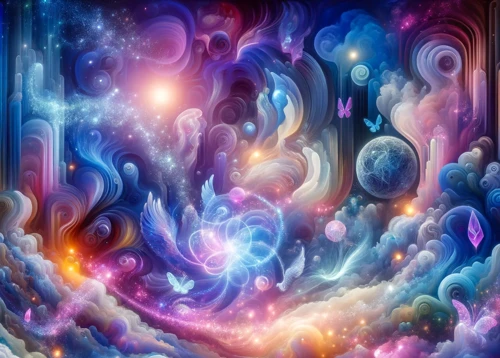Have you ever woken up from a dream that left you shaken and disturbed? Dreams have long been a source of fascination and intrigue, with their ability to transport us to alternate realities and tap into the depths of our subconscious minds. While some dreams may be pleasant and filled with wonder, others can be violent and horrifying. But what do these violent dreams mean? Are they merely a reflection of our fears, or do they hold a deeper spiritual significance? In this comprehensive guide, we will delve into the realm of dreams and explore the spiritual meaning behind violent dreams. Join us as we unravel the hidden messages within these dreams and gain a deeper understanding of our inner selves.
Contents
- The Significance of Dreams
- Exploring the Spiritual Aspect
- Interpreting Violent Dream Scenarios
- Understanding Inner Reflections
- Methods for Analyzing and Processing
- Conclusion
-
Frequently Asked Questions
- 1. Why do we have violent dreams?
- 2. Are violent dreams a cause for concern?
- 3. Can violent dreams come true?
- 4. How can I interpret the symbolism in violent dreams?
- 5. Do violent dreams have spiritual meanings?
- 6. Are there any benefits to having violent dreams?
- 7. How can I cope with the emotional impact of violent dreams?
- 8. Can recurring violent dreams be a sign of a deeper psychological issue?
- 9. Can dream interpretation vary between individuals?
- 10. Can violent dreams be a form of self-expression?
- References
The Significance of Dreams
Dreams hold a significant place in our lives, serving as a gateway to our unconscious minds and providing insights into our innermost thoughts and emotions. Understanding the symbolism of dreams is essential in deciphering their deeper meanings. Dreams reflect our subconscious desires, fears, and unresolved issues, shedding light on aspects of our lives that we may not be fully aware of. Whether they are filled with violence or not, dreams serve as a powerful tool for self-reflection and personal growth. The role of violence in dreams is complex, and it can vary from person to person. While some may experience violent dreams as a result of external factors such as movies or trauma, others may find that these dreams carry a deeper spiritual significance and should not be dismissed. It is important to explore the spiritual aspect of dreams to gain a comprehensive understanding of their meaning and relevance in our lives.
1.1 Understanding Dreams and their Symbolism
Understanding dreams and their symbolism is crucial in unraveling their deeper meanings. Dreams serve as a rich tapestry of symbols and metaphors that communicate our subconscious thoughts and emotions. Each element in a dream carries its own significance, representing various aspects of our lives and inner selves. By analyzing the symbols present in a dream and exploring their personal meaning to the dreamer, we can gain valuable insights into our desires, fears, and unresolved issues. Dreams can take many forms, ranging from vivid and realistic scenarios to abstract and fantastical landscapes. By paying attention to recurring symbols and patterns, we can decipher the underlying messages that our dreams are trying to convey. It is through this understanding that we can unlock the transformative power of dreams and harness their potential for personal growth.
1.2 The Role of Violence in Dreams
– Violence in dreams serves as a manifestation of our inner conflicts and suppressed emotions, providing a symbolic outlet for our deepest fears and frustrations.
– It is important to understand that the violence depicted in dreams is not necessarily a reflection of our real-life actions or intentions, but rather a representation of our psychological and emotional state.
– Exploring the role of violence in dreams can provide valuable insights into unresolved issues, unresolved conflicts, and the need for personal growth and healing.
– The presence of violence in dreams may be a sign of unexpressed anger, fear, or trauma that needs to be acknowledged and addressed.
– By analyzing and interpreting the role of violence in dreams, we can gain a deeper understanding of ourselves and work towards inner peace and healing.
– Understanding the spiritual significance of violence in dreams can lead to personal growth and transformation, allowing us to confront and integrate our shadow selves.
Exploring the Spiritual Aspect
When it comes to exploring the spiritual aspect of dreams, we delve into the connection between our dreams and the spiritual realm. Dreams have been recognized as a means for connecting with a higher power or receiving messages from the divine. They can act as a portal to our deeper spiritual selves, offering profound insights and guidance. In the exploration of violent dreams, it is essential to perceive them as more than just random occurrences, but rather as a means of communication from a higher spiritual plane. By uncovering the hidden messages within these dreams, we can tap into our subconscious and gain a deeper understanding of our soul’s journey. It is through this exploration that we can find meaning, healing, and spiritual growth.
2.1 How Dreams Connect to the Spiritual Realm
Dreams have a profound connection to the spiritual realm, acting as a bridge between our physical world and the unseen dimensions. In the spiritual realm, dreams are considered to be a direct channel of communication with higher powers, spirit guides, and the divine. They are believed to provide guidance, messages, and insights that are otherwise inaccessible in our waking state. Cultures throughout history have recognized the spiritual significance of dreams and have used them for divination, prophecy, and personal transformation. By tapping into the spiritual realm through dreams, we can gain wisdom, clarity, and a deeper understanding of ourselves and the world around us. It is through this connection that the spiritual journey of self-discovery and enlightenment can begin.
– Dreams offer a window into our subconscious mind, and violent dreams are no exception. When unpacking the hidden messages embedded within these dreams, it is crucial to approach them with an open mind and a willingness to explore the depths of our own psyche. Violent dreams may symbolize repressed emotions, unresolved conflicts, or unexpressed desires, providing us with valuable insights into areas of our lives that require attention and healing. By uncovering the hidden messages behind these dreams, we can gain a deeper understanding of ourselves and potentially find resolutions to inner turmoil or conflicts. Through self-reflection and analysis, we can begin to unravel the significance of these dreams and use them as a tool for personal growth and self-discovery.
2.3 The Power of Symbolism in Violent Dreams
The power of symbolism in violent dreams cannot be understated. When we experience violence in our dreams, it is often a manifestation of deeper emotions and psychological states. Symbolism allows us to explore the hidden meanings and messages behind these violent dream scenarios. Each element within the dream, whether it’s a person, object, or location, carries symbolic significance that can provide valuable insights into our subconscious minds. For example, a knife in a dream may symbolize aggression or the need to cut ties with someone or something. By deciphering these symbols, we can gain a better understanding of our inner selves and the underlying emotions driving our violent dream experiences.
Interpreting Violent Dream Scenarios
Interpreting violent dream scenarios is crucial in unlocking the deeper meaning behind these unsettling experiences. Various types of violent dream scenarios can occur, each with its own unique symbolism and interpretation. Dreams of physical violence, such as being engaged in a fight or experiencing harm, may indicate a sense of powerlessness or unresolved conflict in our waking lives. Dreams of being chased or attacked can represent feelings of fear or vulnerability. Witnessing violence in dreams may reflect our concerns about the state of the world or feeling overwhelmed by external events. Dreams of fighting or defending can symbolize our struggle to protect ourselves or assert our boundaries. Dreams of killing or being killed can be indicators of transformation and rebirth. Finally, dreams of apocalyptic violence can represent significant changes or transitions occurring in our lives. By carefully analyzing these scenarios and delving into their symbolic representations, we can gain valuable insights into our psyche and navigate our path towards personal growth and self-discovery.
3.1 Dreams of Physical Violence
Dreams of physical violence can be incredibly unsettling and can leave a lasting impact on our emotions upon waking up. These dreams often symbolize feelings of powerlessness, aggression, or the need to assert oneself. It is important to note that the violence depicted in these dreams may not necessarily represent literal violence that one wishes to inflict on others or themselves. Rather, it can be an indication of inner turmoil or unresolved conflicts in waking life. By analyzing the specific scenarios and emotions associated with these dreams, we can gain deeper insights into our subconscious mind and work towards finding resolutions to these underlying issues. Developing a regular practice of journaling and dream recall techniques can be helpful in documenting and exploring these dreams further.
3.2 Dreams of Being Chased or Attacked
Dreams of being chased or attacked can be particularly unsettling. These dreams often represent feelings of vulnerability, fear, or a sense of being overwhelmed in waking life. Being chased may symbolize running away from a problem or an aspect of ourselves that we find challenging to confront. Similarly, being attacked in a dream can reflect unresolved conflicts or the need to protect oneself from external threats. It is important to pay attention to the emotions and details of these dreams, as they can provide valuable insights into our subconscious thoughts and fears. Exploring the spiritual meaning of such dreams can help us uncover hidden aspects of our psyche, leading to personal growth and self-reflection.
3.3 Dreams of Witnessing Violence
Dreams of Witnessing Violence can be particularly unsettling, as they involve observing acts of aggression and harm inflicted upon others without active participation. These dreams may evoke feelings of powerlessness, fear, and anxiety. While it may be tempting to dismiss such dreams as mere random imagery, they often carry a deeper significance. When we dream of witnessing violence, it could symbolize our awareness of conflict and turmoil in our waking lives. It may indicate that we feel overwhelmed or helpless in the face of challenging situations. These dreams can serve as a reminder to examine our role as bystanders in real-life scenarios and consider ways to intervene or take action when we witness injustice or harm being inflicted upon others. Additionally, dreams of witnessing violence can prompt introspection and encourage us to reflect on the impact of violence and aggression in our society and how we can contribute to creating a more peaceful and harmonious world.
3.4 Dreams of Fighting or Defending
Dreams of fighting or defending can be intense and filled with adrenaline. These dreams often signify our need to assert ourselves and protect our boundaries. They may be a reflection of the challenges we face in our waking life or a symbol of inner conflicts that we are grappling with. When we dream of fighting or defending, it is important to pay attention to the emotions and circumstances surrounding the dream. Are we fighting against someone we know or a faceless opponent? Is there a sense of urgency or danger? These dream scenarios may indicate our desire to stand up for ourselves, overcome obstacles, or reclaim power in certain situations. Analyzing these dreams can help us gain clarity on our inner strengths, assertiveness, and the need for self-preservation. By understanding and addressing the underlying emotions and messages in these dreams, we can navigate our waking life with confidence and resilience.
3.5 Dreams of Killing or Being Killed
Dreams of killing or being killed can be particularly distressing and may leave us feeling unsettled upon waking. These types of dreams often symbolize deep internal conflicts or power struggles within ourselves. When we dream of killing someone, it may represent a desire for control or dominance over a certain aspect of our lives. It could be indicative of suppressed anger, frustration, or the need to assert oneself in waking life. On the other hand, dreaming of being killed can signify a sense of powerlessness or vulnerability. It may indicate feelings of insecurity, fear, or a need to let go of certain aspects of our identity. Exploring the symbolism and underlying emotions in these dreams can provide valuable insights into our inner selves and help us navigate through complex emotions and experiences.
3.6 Dreams of Apocalyptic Violence
Dreams of apocalyptic violence can be particularly intense and disturbing. These dreams often depict catastrophic events, such as the end of the world or a major global crisis. The symbolism in these dreams is powerful and can indicate a sense of impending doom or a fear of the unknown. Apocalyptic violence dreams may reflect our anxieties about the state of the world, our concerns about environmental issues, political unrest, or personal insecurities. They can also be a reflection of our subconscious thoughts and fears surrounding major life changes or transitions. It is crucial to explore the underlying messages and emotions behind these dreams to gain a deeper understanding of our own psyche and navigate any feelings of fear or uncertainty.
Understanding Inner Reflections
Understanding inner reflections is a crucial aspect of comprehending the deeper meanings behind violent dreams. These dreams often serve as a mirror, reflecting repressed emotions, desires, and frustrations that we may not be consciously aware of. By exploring the symbolism and scenarios presented in violent dreams, we can begin to unravel the layers of our subconscious and gain insights into our inner selves. It is common for violent dreams to highlight the shadow self, which encompasses the darker aspects of our personalities that we tend to suppress or deny. Through introspection and self-reflection, we can confront these shadow aspects, acknowledge them, and work towards personal growth and resolution. It is important to approach these inner reflections with an open mind and a willingness to confront our own vulnerabilities and fears, as this process can lead to profound self-discovery and transformation.
4.1 Unveiling Repressed Emotions
Unveiling repressed emotions is a crucial aspect of understanding violent dreams. Violent dreams often serve as a way for our subconscious mind to bring repressed emotions to the surface, allowing us to confront and process them. These dreams may be a reflection of unresolved anger, fear, or trauma that we have buried deep within ourselves. By paying attention to the emotions present in these dreams, we can gain valuable insights into our innermost feelings and experiences. It is important to approach these dreams with curiosity and openness, as they can provide an opportunity for healing and personal growth. Through the exploration of repressed emotions, we can begin the journey towards emotional well-being and self-awareness.
4.2 Desires and Frustrations in Violent Dreams
Violent dreams often serve as a means of exploring our deepest desires and frustrations. These dreams may manifest as a way for our subconscious mind to process and release pent-up emotions. They can give us insight into the aspects of our lives where we feel unsatisfied or unfulfilled. Whether it’s a dream of pursuing a forbidden passion or unleashing anger and aggression, these scenarios provide a safe space for exploring our hidden desires and frustrations. By paying attention to the emotions and circumstances in these dreams, we can gain a better understanding of what we truly long for and what may be causing us frustration in our waking lives. It is important to approach these dreams with an open mind and a willingness to explore the deeper layers of ourselves.
4.3 Shadow Self and the Exploration of Darker Aspects
Exploring the concept of the shadow self and delving into our darker aspects is a crucial aspect of understanding the significance of violent dreams. The shadow self refers to the unconscious parts of our personality that we may have repressed or denied. In the context of dreams, violent scenarios can symbolize the emergence of these suppressed aspects, including aggression, anger, or unresolved traumas. It is through the exploration and acceptance of our shadow self that we can gain a deeper understanding of ourselves and bring about personal growth and healing. By acknowledging these darker aspects, we can work towards integrating them into our conscious selves and achieving a greater sense of wholeness. Understanding the role of the shadow self in violent dreams can be an illuminating journey of self-discovery and transformation.
4.4 Seeking Resolution and Personal Growth
Seeking resolution and personal growth is a crucial aspect when it comes to interpreting and processing violent dreams. These dreams often serve as mirrors, reflecting deep-seated emotions and unresolved conflicts within ourselves. By exploring the messages and symbolism within violent dreams, we can gain valuable insights into our inner landscape and take steps towards healing and self-improvement. It is important to approach these dreams with an open mind and a willingness to confront and address the underlying issues they may represent. Seeking guidance from spiritual advisors or embarking on personal reflection through journaling and meditation can aid in the process of seeking resolution and personal growth. Through this journey, we can transform our violent dreams into catalysts for positive change and transformation in our waking lives.
Methods for Analyzing and Processing
Analyzing and processing our dreams is crucial for gaining valuable insights into their deeper meanings and exploring their spiritual significance. There are various methods that can aid us in this process. Journaling and dream recall techniques can help us capture and reflect upon the details of our dreams, allowing us to identify patterns and symbols that may hold significance. Seeking guidance from spiritual advisors such as therapists or counselors can provide valuable perspectives and interpretations. Meditation and mindfulness practices can help us cultivate awareness and connect with our inner selves, facilitating a deeper understanding of our dreams. Additionally, utilizing dream symbols and archetypes can offer further insights into the messages conveyed by our dreams. By employing these methods, we can navigate the intricate landscape of our dreams and uncover the wisdom they offer for our personal growth and self-discovery.
5.1 Journaling and Dream Recall Techniques
Journaling and dream recall techniques are powerful tools for analyzing and understanding the significance of our dreams. Keeping a dream journal allows you to capture the details of your dreams as soon as you wake up, helping you to remember and analyze them later. It is important to write down not only the events and symbols in your dreams, but also your emotions and any insights you may have. This will help you identify patterns and recurring themes in your dreams, providing valuable clues to their meaning. Additionally, practicing dream recall techniques, such as setting the intention to remember your dreams before sleep and keeping a notepad and pen by your bedside, can enhance your ability to recall and interpret your dreams. By using journaling and dream recall techniques, you can unlock the hidden messages and symbolism within your dreams, gaining deeper insights into your inner self and the spiritual significance of your experiences.
5.2 Seeking Guidance from Spiritual Advisors
Seeking guidance from spiritual advisors can be a valuable resource when interpreting and understanding the significance of violent dreams. Enlisting the help of experienced spiritual advisors, such as shamans, psychics, or dream interpreters, can provide unique insights and perspectives. These advisors possess knowledge and expertise in deciphering dream symbolism and can help you navigate the spiritual realm of your dreams. They may offer guidance on how to interpret the violent imagery, explore the underlying messages, and provide strategies for personal growth and healing. Consulting with a spiritual advisor can be particularly beneficial if you feel confused or overwhelmed by your dreams and are seeking a deeper connection to your inner self.
5.3 Meditation and Mindfulness Practices
Meditation and mindfulness practices play a crucial role in interpreting and processing our dreams, particularly when it comes to violent or intense dream scenarios. Through regular meditation and mindfulness exercises, we can cultivate a sense of inner calmness and clarity that allows us to observe our dreams without judgment or attachment. By incorporating meditation into our daily routine, we develop the ability to observe our thoughts and emotions without being overwhelmed by them. This practice can help us gain a deeper understanding of the symbolism and messages within our dreams. By bringing a sense of presence and awareness to our dreams, we can start to unravel the hidden meanings and explore the spiritual dimensions of our experiences.
5.4 Utilizing Dream Symbols and Archetypes
Utilizing dream symbols and archetypes is a powerful method for analyzing and interpreting the meaning behind violent dreams. Dream symbols are images or objects that hold personal significance and can provide valuable insights into the messages conveyed by our dreams. By paying attention to recurring symbols in our dreams, we can begin to understand their deeper meanings and their connection to our waking lives. Archetypes, on the other hand, are universal symbols and themes that are present in the collective unconscious. These archetypes, such as the Hero or the Shadow, can help us explore the deeper layers of our psyche and gain a broader perspective on the messages within our dreams. By analyzing and reflecting on dream symbols and archetypes, we can unlock the hidden wisdom and guidance that our dreams offer, aiding us in our personal growth and self-discovery.
Conclusion
In conclusion, exploring the spiritual meaning of violent dreams brings us closer to understanding our inner selves and the messages our subconscious mind seeks to convey. Through the symbolism and scenarios presented in these dreams, we can gain insights into our hidden desires, fears, and unresolved emotions. By interpreting and analyzing these dreams, we embark on a journey of self-discovery and personal growth. The methods discussed in this guide, such as journaling, seeking guidance from spiritual advisors, practicing meditation, and utilizing dream symbols and archetypes, can assist in the process of analyzing and processing violent dreams. Remember, each dream is unique, and it is crucial to approach the interpretation of dreams with an open mind and a willingness to explore the depths of our inner reflections. Consider keeping a dream journal and regularly practicing self-reflection to deepen your understanding of violent dreams and their significance in your spiritual journey.
Frequently Asked Questions
1. Why do we have violent dreams?
Violent dreams can occur due to a variety of reasons. They may stem from repressed emotions, unresolved conflicts, or even external factors such as movies or stressors in daily life. It is essential to explore the deeper symbolism and messages within these dreams to gain a better understanding of their significance.
2. Are violent dreams a cause for concern?
While violent dreams can be unsettling, they are typically a natural part of the dreaming process. However, if these dreams become frequent, intense, or greatly affect your well-being, it may be beneficial to seek professional guidance or explore the underlying emotions they may be reflecting.
3. Can violent dreams come true?
No, violent dreams are not predictive or prophetic in nature. They are symbolic representations of our inner experiences and emotions rather than indications of actual events that will occur in our waking lives.
4. How can I interpret the symbolism in violent dreams?
Interpreting the symbolism in violent dreams requires a personal and introspective approach. It can be helpful to explore the emotions, images, and themes present in the dream and relate them to your current life circumstances and inner struggles. It may also be beneficial to consult dream dictionaries or work with a professional dream analyst for further guidance.
5. Do violent dreams have spiritual meanings?
Yes, violent dreams can have spiritual meanings. They can serve as messages from the subconscious or the spiritual realm, highlighting deeper aspects of our spiritual journey or calling attention to unresolved issues in our soul.
6. Are there any benefits to having violent dreams?
While violent dreams may not seem beneficial on the surface, they can offer valuable insight into our psyche. They provide an opportunity to confront and process repressed emotions, fears, and frustrations, ultimately leading to personal growth and self-awareness.
7. How can I cope with the emotional impact of violent dreams?
Coping with the emotional impact of violent dreams can be done through various strategies such as journaling, talking to a therapist or supportive friends, practicing mindfulness and relaxation techniques, and seeking guidance from spiritual advisors. These approaches can help in processing and understanding the emotions that arise from such dreams.
8. Can recurring violent dreams be a sign of a deeper psychological issue?
Recurring violent dreams may indicate underlying psychological issues that may benefit from professional assistance. It could be helpful to consult a therapist or psychologist who can help explore any unresolved traumas, fears, or psychological patterns that may be contributing to the frequency of these dreams.
9. Can dream interpretation vary between individuals?
Yes, dream interpretation can vary between individuals as each person’s psyche and personal experiences are unique. While there may be common symbols and archetypes, the specific meaning and relevance of a dream can differ based on personal associations, cultural influences, and individual context.
10. Can violent dreams be a form of self-expression?
Yes, violent dreams can be a form of self-expression as they allow our subconscious mind to process and reconcile conflicting emotions and experiences. They may provide a safe outlet for exploring and releasing intense feelings that may be suppressed or inhibited in our waking lives.







